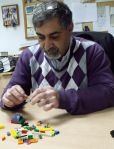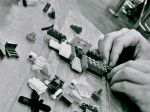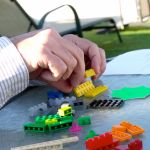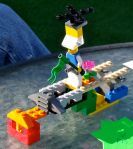Ariel is an Israeli professional, holds an MBA and has degrees in sociology, anthropology and Jewish history. He was born in Argentina and has been living in Israel since 1993. We met in Tel Aviv, on a sunny day at the end of December 2011. After we talked about Israel, it was time for me to see Palestine with his eyes.
‘Build me Palestine’ I ask him.
‘Palestinians… Palestinians…’ he sobs while building his model.
When he finishes, he looks at me:
‘This man is the Palestinian… they have peace in their mind…’
I look at the model and in the attempt to get a full vision of it and to take pictures I turn it so that the minifig could face me, but Ariel stops me. I am puzzled and ask ‘Why?’
‘This man is the Palestinian and he is looking toward the opposite direction, opposite to the way… They have peace in their mind, symbolised by the green bricks…’ he shows me ‘…they are dreaming about peace… No’ – he suddenly stops and corrects himself – ‘it’s not peace, they are dreaming about normalisation and about a free state, it’s not really peace… It’s like Egypt, we have peace with Egypt since 1981, it’s been 30 years. But that’s not real peace though. 10 years ago I went to Egypt, it was in 1991 and I didn’t feel peace like I do here, they don’t like us, let’s say. You won’t see Egyptians here. They don’t come here…’
Palestine from the Israeli Perspective: an endless list of missed opportunities
Palestine’s existence depends on respect and on our children
I have met Dr Rauf Azar at Beit Sahour medical centre. He is the director of the clinic since 2005. The clinic is part of the Health Work Committees in Palestine, a no profit NGO which main goal is to provide health services to the inhabitants of occupied Palestinian territories, with a special focus on patients from marginalised groups, like poor people, women, children and people with special needs. ‘This centre was founded as a clinic’ Dr Azar says, ‘then it expended and became a day care surgery centre and we are on our way to establish here a small hospital for general and reconstructive surgery’. The reconstructive surgery will be the first hospital dealing with reconstruction and it will be the first one in the Palestinian territories and it will be developed in partnership together with the Department of Plastic and Reconstructive surgery in Bari (Italy) and with prof. Michele Pascone.
Then I go straight to the point, and ask Dr Azar What is Palestine?
He does not say a word for a while. Then he looks at the bricks and without even touching them, he firmly says ‘Palestine is nothing here…’.
LWs: A video from Palestine
LWs is an unique investigative method and reading the outcomes of such a process is limiting and doesn’t give a detailed insight into the whole cognitive process.
This video shows you how a LegoView happen: it refers to Aysar’s interview which has already been transcribed and published and it was filmed and edited by Gaetano Veninata and Daniela Sala.
A big thank you to you guys, you have done an amazing work!
The poetic justice of a lost Brick in Jerusalem
I was walking around Jerusalem’s bus station looking at the stalls and the shops when this young man stops me to show me his production. He is kind, he asks me where I am from, we start talking. ‘So, you are a designer, a creative person right?’ I ask him. He nods proudly. ‘Would you like to be part of an experiment with this…’ I ask him while showing him the LEGO bricks. He is puzzled and at the end he accepts.
We go to a cafe and I do not waste time: ‘What is Israel?’ He stares at me and at the bricks. ‘With this pieces it sounds hard…! Should it be the present or what…’. I insist not giving him any clue. ‘Show me what Israel is’. He starts talking, and I invite him not to talk, but to build. He is uncomfortable. He is out of his comfort zone. Shortly he says he is done.
The soft Colonialism’s Obsession
Adam Levick is the CIF Watch managing director since July 2010. He was born in Philadelphia (US) and moved to Israel in 2009. His blog is the story of his personal journey, and it’s through his blog and his work that I decided to contact him.
I meet Adam in a cafe in Jerusalem – he is finishing his work, while I sit down and take out the bricks. Although I have told him about my interviewing technique, he is a little surprised at the beginning but he accepts the challenge and I ask my apparently simple and only question: ‘What is Israel?‘
‘…With These?’ he says looking at the bricks giggling and starting building. After a while he looks at the bricks ‘Mmmh… this is pretty good, I can explain it!’ he says almost surprised about his model.
In Silence [and in bricks] there is eloquence
This month the blog has been silent and quiet, but the there are many kind of silence – some can be more noisy than others. And this was a very noisy kind of silence.
LegoViews is a fast growing idea – this apparent silence has been filled with projects, people, interviews, tests and improvements for the next step. It won’t take me too long to reveal what is brewing. We are taking the bricks to the next level. What is certainly emerging in my experience is that LegoViews is an amazing method to reveal ideas because somehow those little bricks… Talk! Not only they talk, they also make people talking. For this reason, LegoViews is evolving in Talking Bricks. Stay tuned, more to come.
New original interviews with journalists, musicians, professionals, doctors and key figures are on their way, but in the meanwhile you can read the full interview with Mikado Warschawski, which has been published as an exclusive on the London Progressive Journal. The part published here is just the end of our talk, and Warschawski’s views about Palestine, his radical positions and the way he has been playing with LEGO are certainly of interest, both for the method and for the content.
My 2 bricks,
Pat
Israel and the Democracy building process from an Anti-Zionist Perspective
Micheal Warschawski is a well-known pro-palestine, anti-occupation activist, co-founder of the Alternative Information Center. I’ve met him in Jerusalem and we had a long chat about Palestine. His model of Palestine was peculiar, he used also non bricks to underline the external factors mining the stability and the peace making process. But when I ask him about Israel, his reaction is strong.‘What is Israel?!’
Says angrily messing up all the bricks on the table. ‘Here it is…! It’s something incoherent and structured except by its military mind, it’s a nation which is a very weak entity, which is not very big, where the glue is very weak, without borders… why Israel doesn’t have borders? Israel always refused to define borders, it’s something which is chaos, it’s chaos as a way of existence. Always either in the offensive way, conquering more lands, conquering population, they try to get rid of them… it’s a chaos. Not a chaos without a plan.’ ‘There’s a plan?’ I ask. ‘Of course! Judea and all this area, they are making it as biggest as possible provided that it is purely, or as pure as possible, Jewish. This is the plan, the official objective of Israel.’
[Read more]
Holes, walls and bricks: Palestine with Israeli eyes
Michael is a true cosmopolitan Israeli citizen. I’ve met him the day I arrived in Tel Aviv, he asked me what was I doing and when I showed him the LEGO bricks he asked me to be interviewed. I returned to Tel Aviv to meet him. I’ve found him on a very bad day, yet he engaged with the bricks. The first question was about Israel and we had a long and intense conversation about it. Then it was the turn of Palestine. ‘What is Palestine?’ I ask him. He doesn’t say a word, he has understood the process, he doesn’t ask, he builds.
As soon as he finished with LEGO I ask him to tell me about it. He stares at the bricks for a while, thinking. ‘You see… It doesn’t have a bottom. It’s not based on anything – he says by showing me the hole and the lack of any base – because they haven’t succeeded in creating a State; they have a State now but it’s not solid. Also all these Arab countries, in all these more than 60 years… All the Arab countries crying Oh Palestine!‘ – he grows acrimonious – ‘but ask them to do something for them! They didn’t do anything for them. Nothing! Palestinians know that, Arabs like Syrians, Lebanese, use Palestine as propaganda at the UN and in Europe. But they don’t help them. Arafat… Europe sent 900 million euros to Palestine to help them, they could have done a lot with that but Arafat put that money in his pocket and now his wife is pampering around Tunis or wherever…’
This Crazy Thing Called Palestine
Aysar is a young volunteer at Dheisheh Refugee Camp. He was born and grown up there and he studied at Bethlehem University. While introducing himself, he says he believes in some crazy ideas, and I am curious to learn more about them. When I show him the bricks, he is surprised: ‘You remind me about Parmenides… – he says and soon after he admits – ‘I’ve never played with this game…’ I let him play around with the LEGO bricks and then get straight into the question: What is Palestine? ‘What it should be or what it is?’ he asks. I repeat my question, those simple 3 words: What is Palestine. I am not giving him any clue, I want to see what Palestine is for him. The less I say, the more he’ll tell me. He is puzzled, he starts talking but I stop him and ask him to build me his answer ‘We’ll talk after…’ I reassure him. He starts building – he takes the bricks on and off, smokes and builds. After a while he is finished: he spreads all the left bricks around the model ‘Leave them’ he says ‘They are part of it’. ‘So this is Palestine… tell me something about your model’ I ask him. [Read more]
The unbearable lightness of bricks: the Israeli hazard
JK is an experienced business consultant from Israel. He is curious about this LegoView thing. I don’t waste too much time and get straight into the issue. What is Israel? – I ask him. He looks at me and at the bricks. ‘The question is tough!’ he says still puzzled, trying to make his mind while starting building his model.
“Israel, as you can see, has a lots of parts within it… We have the sea, which is the blue part, we have the desert, which is the yellow, and we have the green, which is the forest and the wildlife and a flower here, and the orange is some colourful nature parts. We have our urban landscape and houses, which are the grey and the black bricks. You see – he shows me immediately – the structure is not very stable… it’s linked to some hazardous parts, which is the orange and the red… – he says pointing me out the little red and orange structure which lies next to the end of his model: it’s attached yet separate.‘So what is that?’ I ask him. ‘This is the hazard part of our life – he says – and it’s a substantial part of our life because you see that if you move it, the whole structure falls… So. it’s linked to us, maybe it’s even holding us, but if you move it, there’s the risk that the whole structure would bend, maybe not collapse, but bend. And there’s a ladder – he says pointing at the grey brick – we have to consider to use it or not to use to actually connect these risks.’
[Read More]













